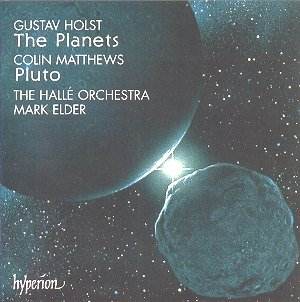Hyperion has a World Premiere on its hands here. When Holst wrote the Planets in the first decade of the 20th Century, we were unaware of the presence of our outermost planet - Pluto. To modern music lovers it must seem somewhat strange that one of our terrestrial partners was missing from Holst's most famous work.
Colin Matthews was asked by the Hallé's then chief conductor, Kent Nagano, to write a concluding movement to the work and it was dedicated to the memory of the original composer's daughter Imogen Holst. Because the movement is intended to follow on from the normal ending without a break, Hyperion has given us the option of listening to the new option as intended. Alternatively we can programme our CD players so we can also hear the original version. This is the reason for the alternative track containing Neptune with its proper fading away.
So, what is it like? Traditionalists will probably be appalled by the changes, but in truth, I don't find a major problem with what has been done. The additional movement is nowhere near the style or sound of Holst, so there should be no discussion on how near or far Colin Matthews has come to matching Holst's original conception. The tempo for the new section is fast, and, according to the composer, this is due to the fact that the piece was inspired by the solar winds, which inhabit the surface of Pluto. If our knowledge of the universe had been as thorough in the 1920s as it is now, then Holst's original work would probably have turned out quite differently, so we shouldn't be surprised at the outcome.
Hyperion has also included a short piece for viola and orchestra, beautifully played by Timothy Pooley. This is a late work of Holst's and deserves to be heard more often. It is probably not performed too often because of its relative brevity.
Would I buy this disc? Most emphatically yes, if I wished to hear the new addition to the work, and Hyperion is lucky that they were able to record this scoop and hit the market with it.
Would I buy this disc as a primary version of the Planets in its original form? Probably not, and the reason for this is relatively simple. The current offering is just not enough out of the ordinary to compete with many of the other versions on the market such as Dutoit, Boult, Previn, Steinberg, Mehta and Karajan to mention just a few.
There is nothing actually wrong with the newcomer. It is just that it does not stand out enough to be talked about in the same terms as the others mentioned. The recording quality - done in the new Bridgewater Hall is fine, but if you want to hear what the Bridgewater Hall can sound like, listen to the BBC Philharmonic version conducted by Tortelier, given away free with the BBC Magazine a couple of years ago.
John Phillips
